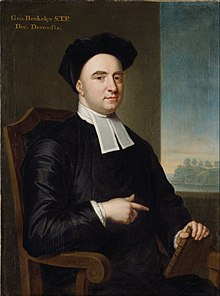Bishop Berkeley
| George Berkeley | |
|---|---|

Portrait of Berkeley by John Smybert, 1727
|
|
| Born |
12 March 1685 County Kilkenny, Ireland |
| Died | 14 January 1753 (aged 67) Oxford, England |
| Nationality | Irish |
| Alma mater | Trinity College, Dublin (BA 1704; MA 1707) |
| Era | 18th century philosophy |
| Region | Western Philosophy |
| School |
Idealism Empiricism |
|
Main interests
|
Christianity, metaphysics, epistemology, language, mathematics, perception |
|
Notable ideas
|
Subjective idealism, master argument |
|
Influences
|
|
| Signature | |
 |
|
George Berkeley (/ˈbɑːrklɪ/; 12 March 1685 – 14 January 1753) — known as Bishop Berkeley (Bishop of Cloyne) — was an Irish philosopher whose primary achievement was the advancement of a theory he called "immaterialism" (later referred to as "subjective idealism" by others). This theory denies the existence of material substance and instead contends that familiar objects like tables and chairs are only ideas in the minds of perceivers and, as a result, cannot exist without being perceived. Berkeley is also known for his critique of abstraction, an important premise in his argument for immaterialism.
In 1709, Berkeley published his first major work, , in which he discussed the limitations of human vision and advanced the theory that the proper objects of sight are not material objects, but light and colour. This foreshadowed his chief philosophical work, A Treatise Concerning the Principles of Human Knowledge, in 1710, which, after its poor reception, he rewrote in dialogue form and published under the title Three Dialogues between Hylas and Philonous in 1713.
In this book, Berkeley's views were represented by Philonous (Greek: "lover of mind"), while Hylas (Greek: "matter") embodies the Irish thinker's opponents, in particular John Locke. Berkeley argued against Sir Isaac Newton's doctrine of absolute space, time and motion in De Motu (On Motion), published 1721. His arguments were a precursor to the views of Mach and Einstein. In 1732, he published Alciphron, a Christian apologetic against the free-thinkers, and in 1734, he published The Analyst, a critique of the foundations of calculus, which was influential in the development of mathematics.
...
Wikipedia
